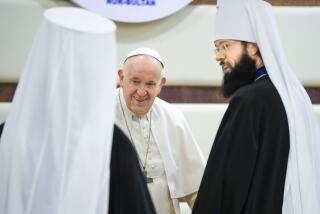Italian Priest a 20-Year Kabul Resident--and Survivor of Many Brushes With Fate : Italian Priest in Kabul Flirts With Fate
- Share via
KABUL, Afghanistan — The Rev. Angelo Panigati stood directly under a crucifix when a bomb landed nearby, gutting the Italian Embassy and sending the Roman Catholic priest scurrying for cover.
Following his two dogs through a broken pane of glass into his chapel, Panigati took refuge with his pups in a corner. More bombs came, shaking the embassy grounds.
Last Sunday--his first since the recent bloody coup attempt--the 65-year-old ruddy-faced Italian prayed for the Afghan people. He appeared to give no thought to his own brush with death.
“I don’t believe in miracles,” said Panigati, who’s been in Afghanistan since he was 40. “But I’m about to.”
His congregation, a gathering of 12, laughed. Last Sunday services were moved to Panigati’s living room while the bomb-damaged chapel underwent repairs.
The Italian Embassy and surrounding buildings were just several of scores of structures around Kabul destroyed by bombs dropped by renegade fighter pilots. At least 95 civilians were killed and 197 injured in the failed coup. No military casualties have been released.
No one was in the embassy at the time of the attack.
Western missions left Afghanistan a little more than a year ago as Soviet troops withdrew after a 10-year intervention, wrongly expecting the swift collapse of President Najibullah’s government at the hands of Muslim guerrillas. Kabul now has just 21 functioning foreign embassies.
The coup appears to have put on hold plans by some Western countries to return. Planned low-level diplomatic visits from Italy, Austria, France and Britain have been postponed, diplomats say.
At the Italian compound, the bomb blew out windows in the embassy, bending the reinforced steel on the windows like rubber. Windows were knocked out in the chapel 300 feet away and in Panigati’s house next door.
A crater 10 feet deep and 20 feet wide yawned opposite the embassy.
The father’s beloved greenhouse was also gutted.
“I’ll just have to start it all over again,” he said as he surveyed the damage, dressed in an Afghan sweater and an apron decorated with blue ducks.
It won’t be the first time.
Since the civil war began in the late 1970s, Panigati has experienced rocket attacks and raining flares, which Soviet planes drop to confuse heat-seeking missiles as they circle Kabul.
Everything seems to hit the greenhouse.
“Flares are the fruit of Kabul,” he said with a chuckle. “Instead of cherries or apples we get these.”
The priest opened a drawer in his living room revealing a collection of hundreds of spent flares.
Panigati belongs to the Barnabites, a Catholic order founded in 1533. The Barnabites opened their mission in Afghanistan on Jan. 1, 1933, after an agreement between the Italian dictator Benito Mussolini, the Vatican and the Afghan government.
Fascist Italy was the second government after the Soviet Union to recognize King Amanullah Khan, so the Afghan government welcomed Italian priests.
Panigati’s mission has been limited to serving the foreign community. No missionary work is allowed. But the priest, who speaks 10 languages, has been allowed to teach.
All of Kabul’s secondary schools are closed now--the war--so he has private students.
Panigati said his close call with the bomb didn’t frighten him.
“I’ve been through all of this before,” he said.
During World War II, a German soldier was shot in Panigati’s town and Germans decided to take revenge by killing some civilians. Panigati was one of those chosen to die.
“They put me against the wall to shoot me but then bombings began and I ran off.”
Later, he was on his way to the Dachau concentration camp when another bombing attack derailed the train. Panigati said he escaped into a corn field.
The other day, after the fighting ended, Panigati said he awoke to a “beautiful symphony.”
“It was a symphony of sweeping glass,” he said. “Everywhere around me, I heard the sound and I thought, ‘Lord, how good it is for us to be here.’ ”
More to Read
Sign up for Essential California
The most important California stories and recommendations in your inbox every morning.
You may occasionally receive promotional content from the Los Angeles Times.













